BEA111 Principles of Economics: South China Sea Conflict Analysis
VerifiedAdded on 2023/06/11
|6
|1566
|454
Essay
AI Summary
This essay examines the economic dimensions of the South China Sea disputes, focusing on the conflicting interests of various sovereign states, including Brunei, China, Indonesia, Malaysia, Vietnam, and the Philippines. The conflict arises from competing claims over islands and maritime rights, particularly regarding access to fisheries. The essay highlights the political and economic aspects of the disputes, discussing issues such as declining fish stocks, illegal fishing practices, and the economic importance of the South China Sea's fisheries to regional economies. It further analyzes the economic concept of excessive fishing, emphasizing the role of sustainability, economic importance, declining access, and increasing demand. Finally, the essay proposes policies for managing fishing activities and resolving the conflict through international agreements, while also considering the implications for domestic markets and international relations. Desklib provides similar essays and resources for students.
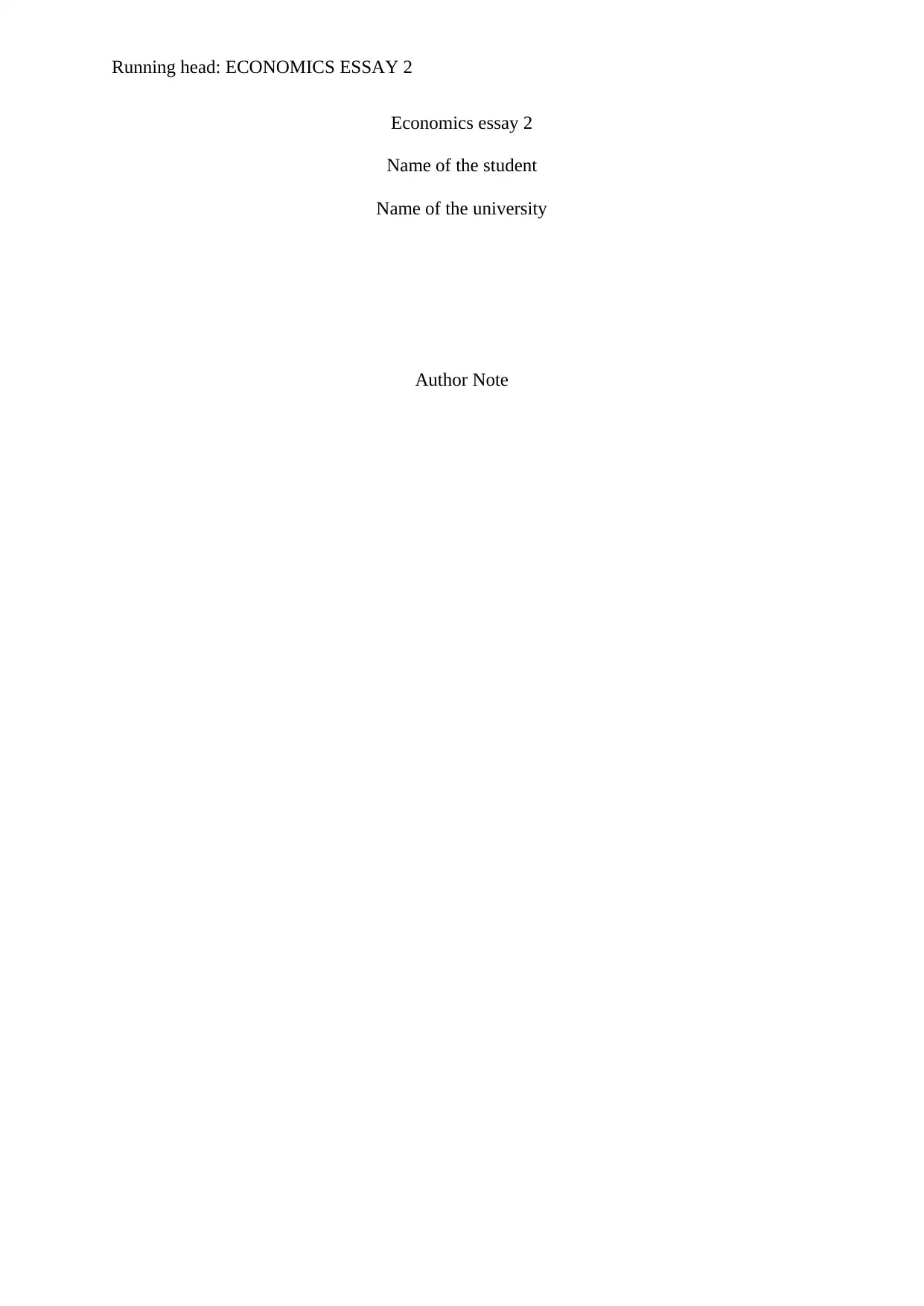
Running head: ECONOMICS ESSAY 2
Economics essay 2
Name of the student
Name of the university
Author Note
Economics essay 2
Name of the student
Name of the university
Author Note
Paraphrase This Document
Need a fresh take? Get an instant paraphrase of this document with our AI Paraphraser
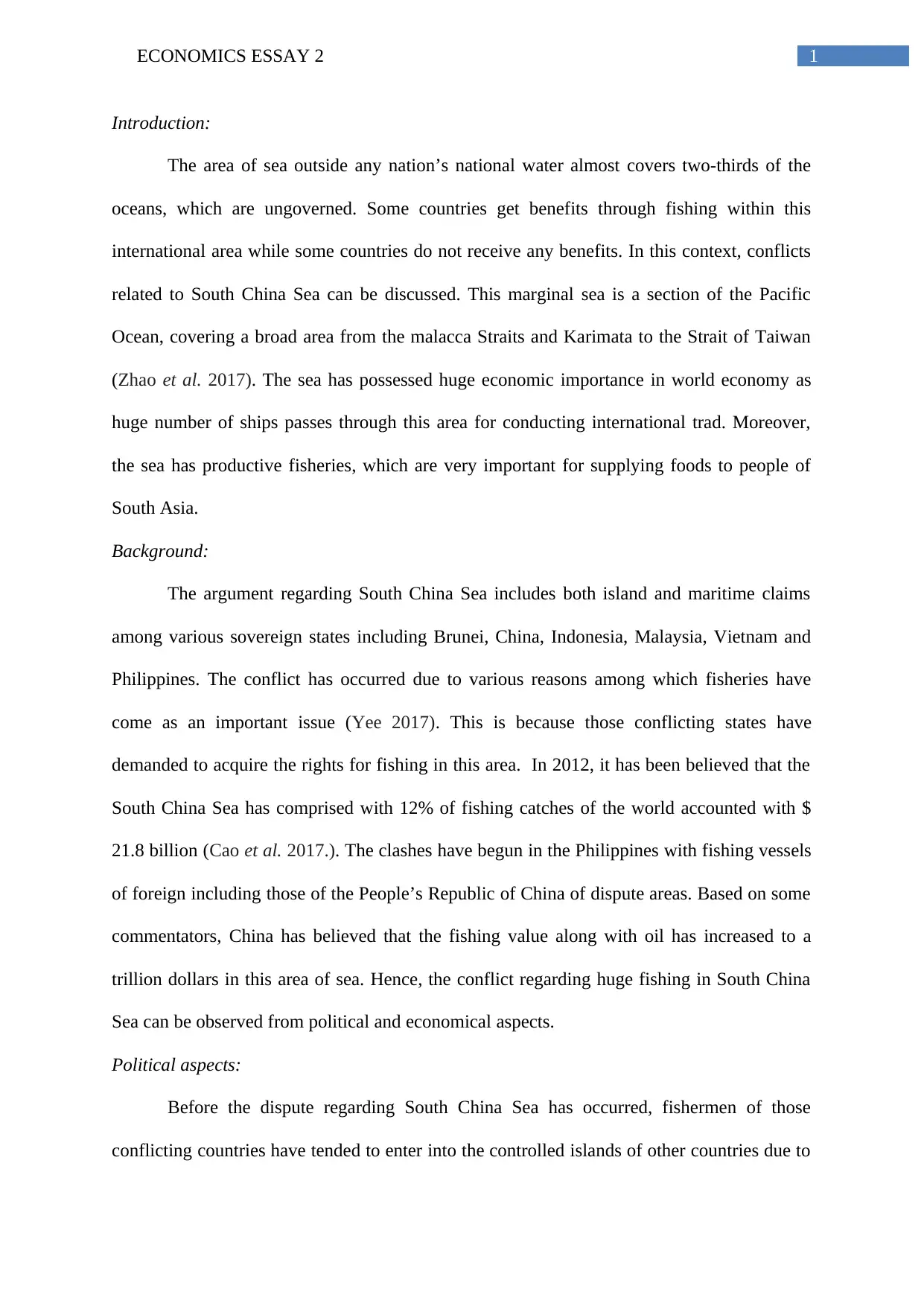
1ECONOMICS ESSAY 2
Introduction:
The area of sea outside any nation’s national water almost covers two-thirds of the
oceans, which are ungoverned. Some countries get benefits through fishing within this
international area while some countries do not receive any benefits. In this context, conflicts
related to South China Sea can be discussed. This marginal sea is a section of the Pacific
Ocean, covering a broad area from the malacca Straits and Karimata to the Strait of Taiwan
(Zhao et al. 2017). The sea has possessed huge economic importance in world economy as
huge number of ships passes through this area for conducting international trad. Moreover,
the sea has productive fisheries, which are very important for supplying foods to people of
South Asia.
Background:
The argument regarding South China Sea includes both island and maritime claims
among various sovereign states including Brunei, China, Indonesia, Malaysia, Vietnam and
Philippines. The conflict has occurred due to various reasons among which fisheries have
come as an important issue (Yee 2017). This is because those conflicting states have
demanded to acquire the rights for fishing in this area. In 2012, it has been believed that the
South China Sea has comprised with 12% of fishing catches of the world accounted with $
21.8 billion (Cao et al. 2017.). The clashes have begun in the Philippines with fishing vessels
of foreign including those of the People’s Republic of China of dispute areas. Based on some
commentators, China has believed that the fishing value along with oil has increased to a
trillion dollars in this area of sea. Hence, the conflict regarding huge fishing in South China
Sea can be observed from political and economical aspects.
Political aspects:
Before the dispute regarding South China Sea has occurred, fishermen of those
conflicting countries have tended to enter into the controlled islands of other countries due to
Introduction:
The area of sea outside any nation’s national water almost covers two-thirds of the
oceans, which are ungoverned. Some countries get benefits through fishing within this
international area while some countries do not receive any benefits. In this context, conflicts
related to South China Sea can be discussed. This marginal sea is a section of the Pacific
Ocean, covering a broad area from the malacca Straits and Karimata to the Strait of Taiwan
(Zhao et al. 2017). The sea has possessed huge economic importance in world economy as
huge number of ships passes through this area for conducting international trad. Moreover,
the sea has productive fisheries, which are very important for supplying foods to people of
South Asia.
Background:
The argument regarding South China Sea includes both island and maritime claims
among various sovereign states including Brunei, China, Indonesia, Malaysia, Vietnam and
Philippines. The conflict has occurred due to various reasons among which fisheries have
come as an important issue (Yee 2017). This is because those conflicting states have
demanded to acquire the rights for fishing in this area. In 2012, it has been believed that the
South China Sea has comprised with 12% of fishing catches of the world accounted with $
21.8 billion (Cao et al. 2017.). The clashes have begun in the Philippines with fishing vessels
of foreign including those of the People’s Republic of China of dispute areas. Based on some
commentators, China has believed that the fishing value along with oil has increased to a
trillion dollars in this area of sea. Hence, the conflict regarding huge fishing in South China
Sea can be observed from political and economical aspects.
Political aspects:
Before the dispute regarding South China Sea has occurred, fishermen of those
conflicting countries have tended to enter into the controlled islands of other countries due to
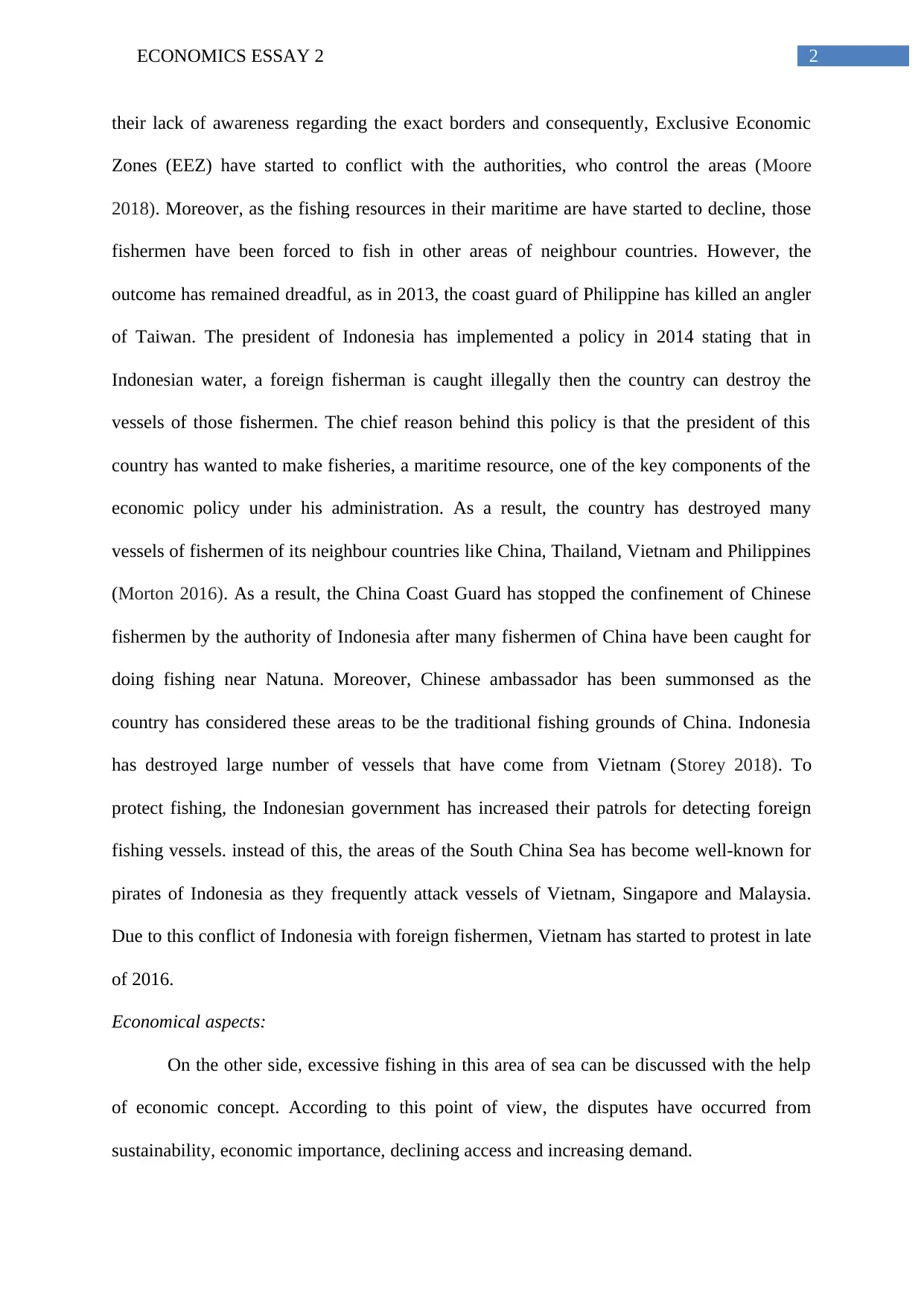
2ECONOMICS ESSAY 2
their lack of awareness regarding the exact borders and consequently, Exclusive Economic
Zones (EEZ) have started to conflict with the authorities, who control the areas (Moore
2018). Moreover, as the fishing resources in their maritime are have started to decline, those
fishermen have been forced to fish in other areas of neighbour countries. However, the
outcome has remained dreadful, as in 2013, the coast guard of Philippine has killed an angler
of Taiwan. The president of Indonesia has implemented a policy in 2014 stating that in
Indonesian water, a foreign fisherman is caught illegally then the country can destroy the
vessels of those fishermen. The chief reason behind this policy is that the president of this
country has wanted to make fisheries, a maritime resource, one of the key components of the
economic policy under his administration. As a result, the country has destroyed many
vessels of fishermen of its neighbour countries like China, Thailand, Vietnam and Philippines
(Morton 2016). As a result, the China Coast Guard has stopped the confinement of Chinese
fishermen by the authority of Indonesia after many fishermen of China have been caught for
doing fishing near Natuna. Moreover, Chinese ambassador has been summonsed as the
country has considered these areas to be the traditional fishing grounds of China. Indonesia
has destroyed large number of vessels that have come from Vietnam (Storey 2018). To
protect fishing, the Indonesian government has increased their patrols for detecting foreign
fishing vessels. instead of this, the areas of the South China Sea has become well-known for
pirates of Indonesia as they frequently attack vessels of Vietnam, Singapore and Malaysia.
Due to this conflict of Indonesia with foreign fishermen, Vietnam has started to protest in late
of 2016.
Economical aspects:
On the other side, excessive fishing in this area of sea can be discussed with the help
of economic concept. According to this point of view, the disputes have occurred from
sustainability, economic importance, declining access and increasing demand.
their lack of awareness regarding the exact borders and consequently, Exclusive Economic
Zones (EEZ) have started to conflict with the authorities, who control the areas (Moore
2018). Moreover, as the fishing resources in their maritime are have started to decline, those
fishermen have been forced to fish in other areas of neighbour countries. However, the
outcome has remained dreadful, as in 2013, the coast guard of Philippine has killed an angler
of Taiwan. The president of Indonesia has implemented a policy in 2014 stating that in
Indonesian water, a foreign fisherman is caught illegally then the country can destroy the
vessels of those fishermen. The chief reason behind this policy is that the president of this
country has wanted to make fisheries, a maritime resource, one of the key components of the
economic policy under his administration. As a result, the country has destroyed many
vessels of fishermen of its neighbour countries like China, Thailand, Vietnam and Philippines
(Morton 2016). As a result, the China Coast Guard has stopped the confinement of Chinese
fishermen by the authority of Indonesia after many fishermen of China have been caught for
doing fishing near Natuna. Moreover, Chinese ambassador has been summonsed as the
country has considered these areas to be the traditional fishing grounds of China. Indonesia
has destroyed large number of vessels that have come from Vietnam (Storey 2018). To
protect fishing, the Indonesian government has increased their patrols for detecting foreign
fishing vessels. instead of this, the areas of the South China Sea has become well-known for
pirates of Indonesia as they frequently attack vessels of Vietnam, Singapore and Malaysia.
Due to this conflict of Indonesia with foreign fishermen, Vietnam has started to protest in late
of 2016.
Economical aspects:
On the other side, excessive fishing in this area of sea can be discussed with the help
of economic concept. According to this point of view, the disputes have occurred from
sustainability, economic importance, declining access and increasing demand.
⊘ This is a preview!⊘
Do you want full access?
Subscribe today to unlock all pages.

Trusted by 1+ million students worldwide
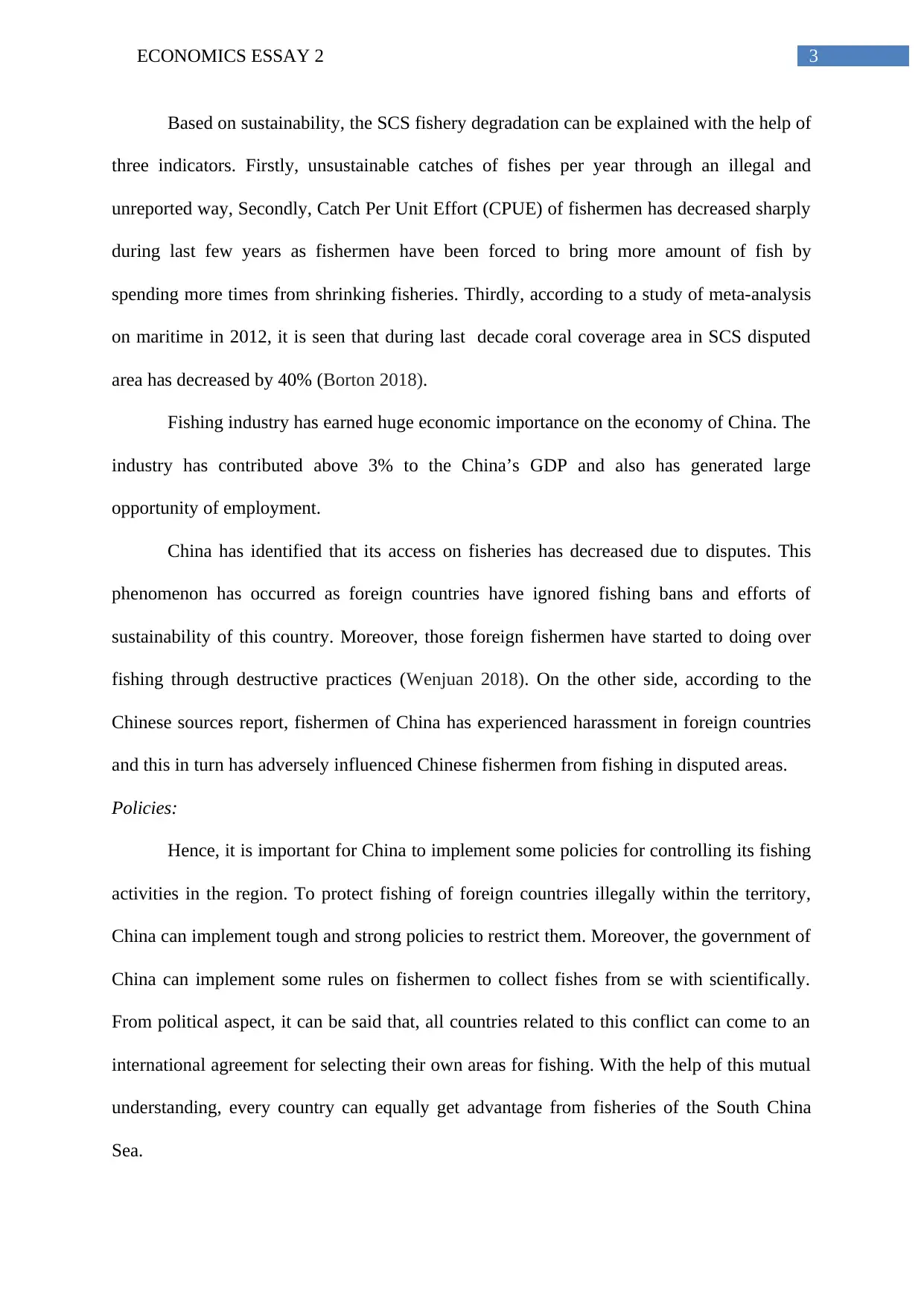
3ECONOMICS ESSAY 2
Based on sustainability, the SCS fishery degradation can be explained with the help of
three indicators. Firstly, unsustainable catches of fishes per year through an illegal and
unreported way, Secondly, Catch Per Unit Effort (CPUE) of fishermen has decreased sharply
during last few years as fishermen have been forced to bring more amount of fish by
spending more times from shrinking fisheries. Thirdly, according to a study of meta-analysis
on maritime in 2012, it is seen that during last decade coral coverage area in SCS disputed
area has decreased by 40% (Borton 2018).
Fishing industry has earned huge economic importance on the economy of China. The
industry has contributed above 3% to the China’s GDP and also has generated large
opportunity of employment.
China has identified that its access on fisheries has decreased due to disputes. This
phenomenon has occurred as foreign countries have ignored fishing bans and efforts of
sustainability of this country. Moreover, those foreign fishermen have started to doing over
fishing through destructive practices (Wenjuan 2018). On the other side, according to the
Chinese sources report, fishermen of China has experienced harassment in foreign countries
and this in turn has adversely influenced Chinese fishermen from fishing in disputed areas.
Policies:
Hence, it is important for China to implement some policies for controlling its fishing
activities in the region. To protect fishing of foreign countries illegally within the territory,
China can implement tough and strong policies to restrict them. Moreover, the government of
China can implement some rules on fishermen to collect fishes from se with scientifically.
From political aspect, it can be said that, all countries related to this conflict can come to an
international agreement for selecting their own areas for fishing. With the help of this mutual
understanding, every country can equally get advantage from fisheries of the South China
Sea.
Based on sustainability, the SCS fishery degradation can be explained with the help of
three indicators. Firstly, unsustainable catches of fishes per year through an illegal and
unreported way, Secondly, Catch Per Unit Effort (CPUE) of fishermen has decreased sharply
during last few years as fishermen have been forced to bring more amount of fish by
spending more times from shrinking fisheries. Thirdly, according to a study of meta-analysis
on maritime in 2012, it is seen that during last decade coral coverage area in SCS disputed
area has decreased by 40% (Borton 2018).
Fishing industry has earned huge economic importance on the economy of China. The
industry has contributed above 3% to the China’s GDP and also has generated large
opportunity of employment.
China has identified that its access on fisheries has decreased due to disputes. This
phenomenon has occurred as foreign countries have ignored fishing bans and efforts of
sustainability of this country. Moreover, those foreign fishermen have started to doing over
fishing through destructive practices (Wenjuan 2018). On the other side, according to the
Chinese sources report, fishermen of China has experienced harassment in foreign countries
and this in turn has adversely influenced Chinese fishermen from fishing in disputed areas.
Policies:
Hence, it is important for China to implement some policies for controlling its fishing
activities in the region. To protect fishing of foreign countries illegally within the territory,
China can implement tough and strong policies to restrict them. Moreover, the government of
China can implement some rules on fishermen to collect fishes from se with scientifically.
From political aspect, it can be said that, all countries related to this conflict can come to an
international agreement for selecting their own areas for fishing. With the help of this mutual
understanding, every country can equally get advantage from fisheries of the South China
Sea.
Paraphrase This Document
Need a fresh take? Get an instant paraphrase of this document with our AI Paraphraser
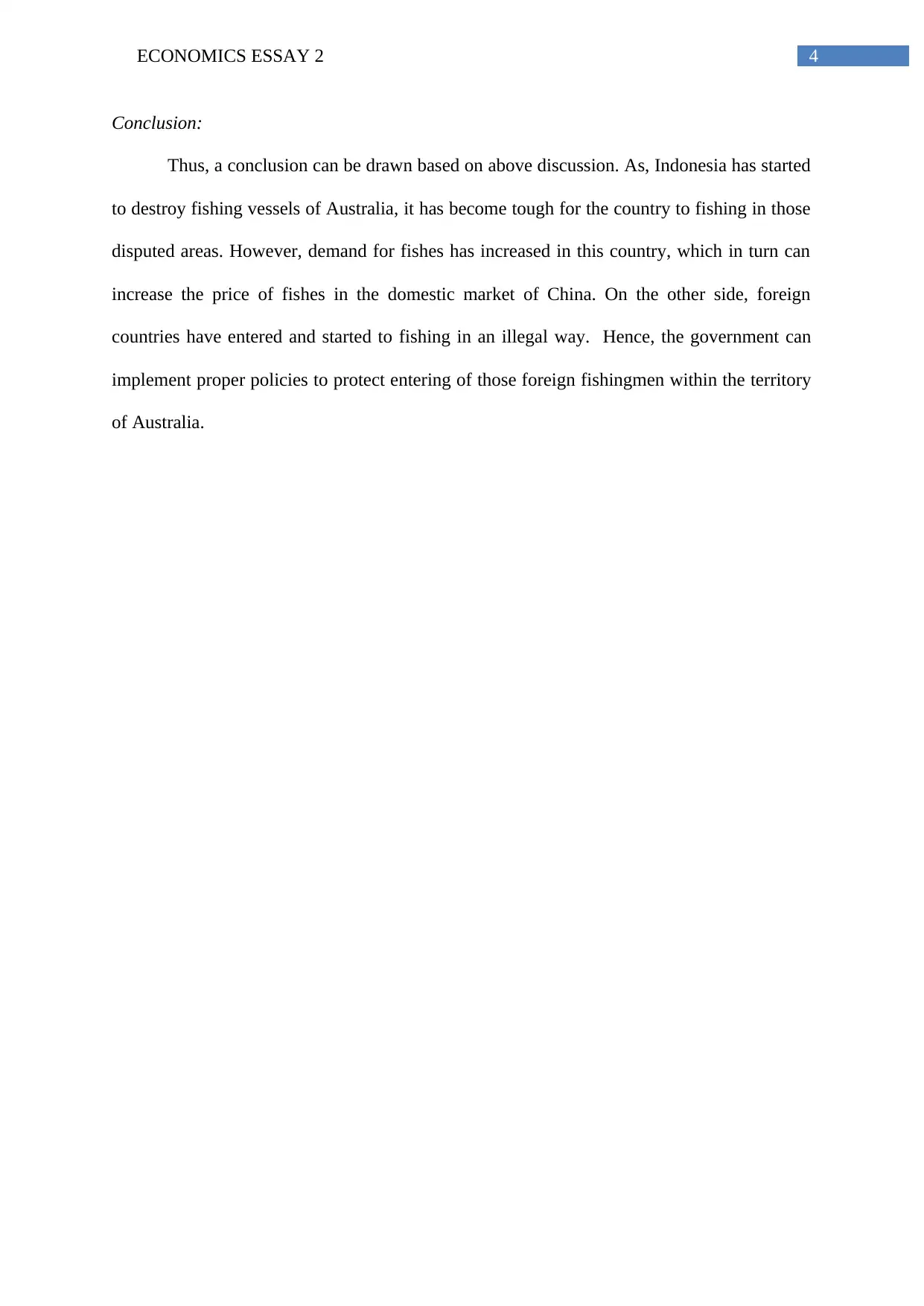
4ECONOMICS ESSAY 2
Conclusion:
Thus, a conclusion can be drawn based on above discussion. As, Indonesia has started
to destroy fishing vessels of Australia, it has become tough for the country to fishing in those
disputed areas. However, demand for fishes has increased in this country, which in turn can
increase the price of fishes in the domestic market of China. On the other side, foreign
countries have entered and started to fishing in an illegal way. Hence, the government can
implement proper policies to protect entering of those foreign fishingmen within the territory
of Australia.
Conclusion:
Thus, a conclusion can be drawn based on above discussion. As, Indonesia has started
to destroy fishing vessels of Australia, it has become tough for the country to fishing in those
disputed areas. However, demand for fishes has increased in this country, which in turn can
increase the price of fishes in the domestic market of China. On the other side, foreign
countries have entered and started to fishing in an illegal way. Hence, the government can
implement proper policies to protect entering of those foreign fishingmen within the territory
of Australia.
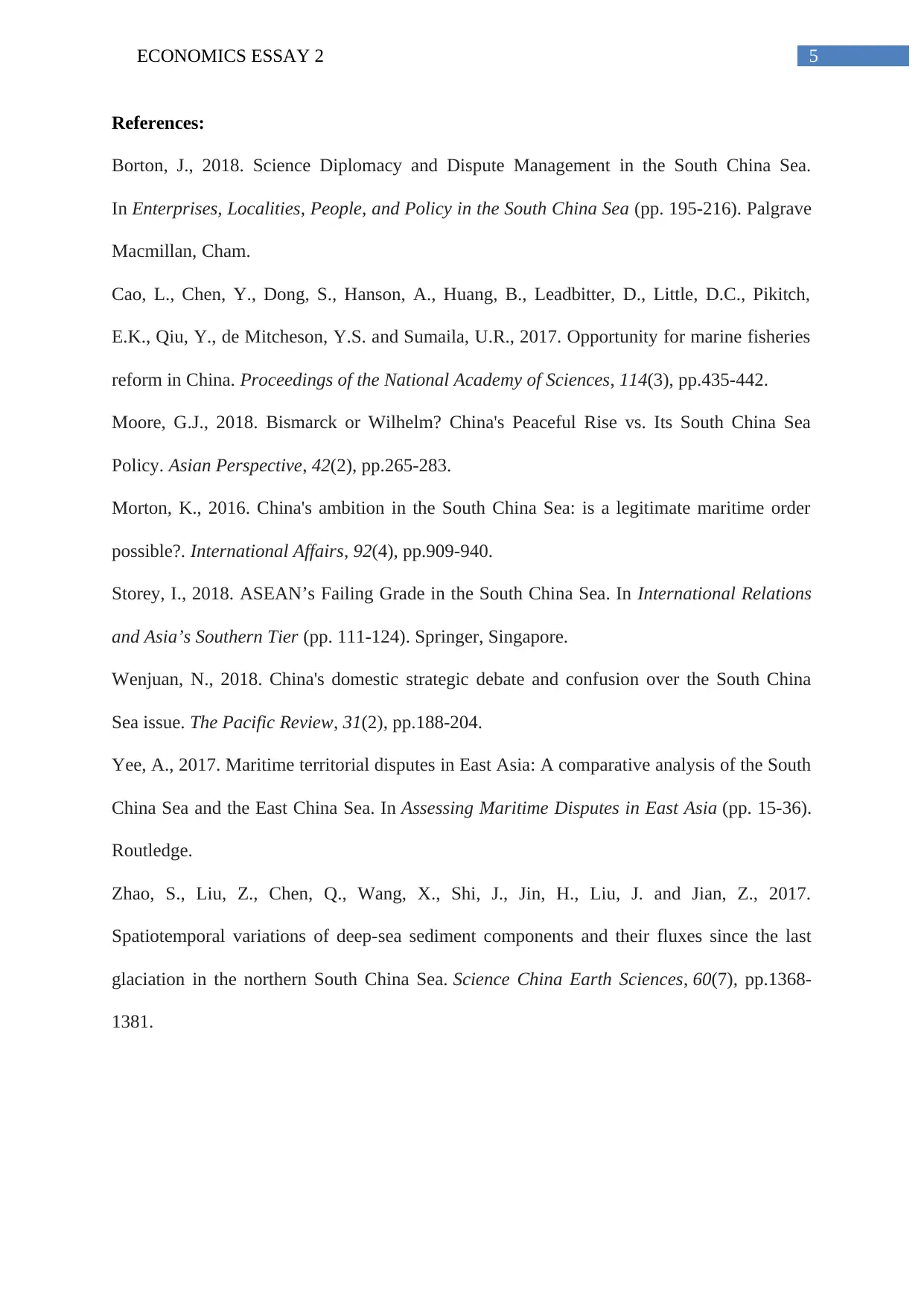
5ECONOMICS ESSAY 2
References:
Borton, J., 2018. Science Diplomacy and Dispute Management in the South China Sea.
In Enterprises, Localities, People, and Policy in the South China Sea (pp. 195-216). Palgrave
Macmillan, Cham.
Cao, L., Chen, Y., Dong, S., Hanson, A., Huang, B., Leadbitter, D., Little, D.C., Pikitch,
E.K., Qiu, Y., de Mitcheson, Y.S. and Sumaila, U.R., 2017. Opportunity for marine fisheries
reform in China. Proceedings of the National Academy of Sciences, 114(3), pp.435-442.
Moore, G.J., 2018. Bismarck or Wilhelm? China's Peaceful Rise vs. Its South China Sea
Policy. Asian Perspective, 42(2), pp.265-283.
Morton, K., 2016. China's ambition in the South China Sea: is a legitimate maritime order
possible?. International Affairs, 92(4), pp.909-940.
Storey, I., 2018. ASEAN’s Failing Grade in the South China Sea. In International Relations
and Asia’s Southern Tier (pp. 111-124). Springer, Singapore.
Wenjuan, N., 2018. China's domestic strategic debate and confusion over the South China
Sea issue. The Pacific Review, 31(2), pp.188-204.
Yee, A., 2017. Maritime territorial disputes in East Asia: A comparative analysis of the South
China Sea and the East China Sea. In Assessing Maritime Disputes in East Asia (pp. 15-36).
Routledge.
Zhao, S., Liu, Z., Chen, Q., Wang, X., Shi, J., Jin, H., Liu, J. and Jian, Z., 2017.
Spatiotemporal variations of deep-sea sediment components and their fluxes since the last
glaciation in the northern South China Sea. Science China Earth Sciences, 60(7), pp.1368-
1381.
References:
Borton, J., 2018. Science Diplomacy and Dispute Management in the South China Sea.
In Enterprises, Localities, People, and Policy in the South China Sea (pp. 195-216). Palgrave
Macmillan, Cham.
Cao, L., Chen, Y., Dong, S., Hanson, A., Huang, B., Leadbitter, D., Little, D.C., Pikitch,
E.K., Qiu, Y., de Mitcheson, Y.S. and Sumaila, U.R., 2017. Opportunity for marine fisheries
reform in China. Proceedings of the National Academy of Sciences, 114(3), pp.435-442.
Moore, G.J., 2018. Bismarck or Wilhelm? China's Peaceful Rise vs. Its South China Sea
Policy. Asian Perspective, 42(2), pp.265-283.
Morton, K., 2016. China's ambition in the South China Sea: is a legitimate maritime order
possible?. International Affairs, 92(4), pp.909-940.
Storey, I., 2018. ASEAN’s Failing Grade in the South China Sea. In International Relations
and Asia’s Southern Tier (pp. 111-124). Springer, Singapore.
Wenjuan, N., 2018. China's domestic strategic debate and confusion over the South China
Sea issue. The Pacific Review, 31(2), pp.188-204.
Yee, A., 2017. Maritime territorial disputes in East Asia: A comparative analysis of the South
China Sea and the East China Sea. In Assessing Maritime Disputes in East Asia (pp. 15-36).
Routledge.
Zhao, S., Liu, Z., Chen, Q., Wang, X., Shi, J., Jin, H., Liu, J. and Jian, Z., 2017.
Spatiotemporal variations of deep-sea sediment components and their fluxes since the last
glaciation in the northern South China Sea. Science China Earth Sciences, 60(7), pp.1368-
1381.
⊘ This is a preview!⊘
Do you want full access?
Subscribe today to unlock all pages.

Trusted by 1+ million students worldwide
1 out of 6
Your All-in-One AI-Powered Toolkit for Academic Success.
+13062052269
info@desklib.com
Available 24*7 on WhatsApp / Email
![[object Object]](/_next/static/media/star-bottom.7253800d.svg)
Unlock your academic potential
Copyright © 2020–2026 A2Z Services. All Rights Reserved. Developed and managed by ZUCOL.

